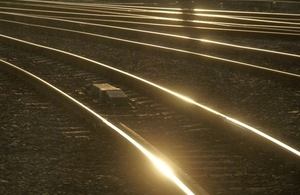Welsh Secretary: Economic potential of Wrexham-Bidston electrification is significant
Key stakeholders meet to discuss the economic case for Wrexham to Bidston railway electrification.

Wrexham-Bidston electrification
Secretary of State for Wales, David Jones continued to underline his ambition for improving rail infrastructure in north Wales today (22 Aug) as he assembled a group of key stakeholders to discuss the business case for electrification of the Wrexham to Bidston line.
Mr Jones welcomed members of the North Wales Economic Ambition Board , along with representatives of the Liverpool Local Enterprise Partnership and the Wirral Waters Enterprise Zone to the roundtable meeting at Deeside Enterprise Zone, to gather views on how improving the rail links between enterprise zones in north east Wales and north west England could benefit the local economy.
The information provided by the representatives of the local authority and business community present from both sides of the border will be used to further strengthen the economic case for electrification of the Wrexham to Bidston line.
Secretary of State for Wales, David Jones said:
The Government takes the firm view that improving Britain’s infrastructure is vitally important to delivering long-term, balanced economic growth across the country.
Despite the huge level of improvements we have already committed through the delivery of electrification of the south Wales and Valley lines, I have always been clear that this is not the end of my ambition for improving rail infrastructure in Wales.
In north Wales, the economic potential of electrification is significant. Together, Deeside and Wrexham make up one of the most important industrial areas in Europe and, regardless of borders, north east Wales and north west England form one single economic entity. The designation of Deeside and Wirral Waters as Enterprise Zones makes improving connectivity between the two areas more pressing than ever.
The existing Manchester Metrolink and the Midland Metro project are clear examples of how improved infrastructure links can bring far-reaching benefits, through job creation and economic output. Electrification of the Wrexham to Bidston line could well be a critical investment to help stimulate further investment at the enterprise zones on both sides of the border.
I am happy to say that work on the business case for further electrification is now well underway. The views and insight I’ve received today will help bolster that case as we continue to put the components in place to make Wales an easier, more attractive place to invest.
Wales is already set to benefit directly and indirectly by almost £2 billion from the UK Government programme to modernise the rail network. When it is completed, nearly two thirds of the population of Wales will have access to faster, cleaner, greener train services.
Photo courtesy of freefotouk on Flickr.